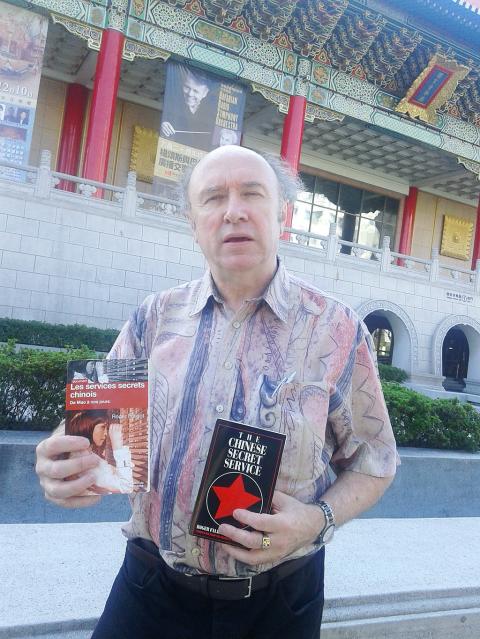Roger Faligot, a specialist on the world’s most secretive intelligence agencies, was recently in Taiwan to find a publisher to translate into Chinese and release his The Chinese Secret Service, from Mao to 2008 Beijing Olympic Games, a book that was published in 2008.
Faligot is no stranger to the intelligence community and espionage. He has published dozens of books on the worlds’ security services, including the KGB, CIA, MI6, French intelligence agency DGSE and, of course, the Chinese secret service.
CLANDESTINE WORLD

Photo: Jason Pan, Taipei Times
The Chinese Secret Service lifts the veil on the history of the Chinese intelligence organization, from its early years to its modern transformation into an effective, fearsome force in the form of the Ministry of State Security (國安部).
It details mass purges, assassinations, double-cross betrayals, ideological battles, political manipulation, domestic and foreign operations by Chinese intelligence through high-profile figures such as Zhou Enlai (周恩來), Kang Sheng (康生), Chen Yun (陳雲), Li Kenong (李克農) and Wang Dongxing (汪東興).
Faligot says that in having the book translated into Chinese, he hopes that it will be read on both sides of the Taiwan Strait.
“The publication could be part of the intellectual debates that are bound to become more and more important in China and in Taiwan. I think in Beijing the governmental circles understand that if I write a big history of the intelligence and security services, it is because from now on China must be considered on that level just as important as it is on the economic or diplomatic level,” he said, adding that he hopes to interview Geng Huichang (耿惠昌), China’s minister for State Security.
PIRATED BOOKS
Faligot has other motivations for publishing the book in Chinese. He said that an earlier book on the French secret service, La Piscine: The French Secret Service Since 1944, appeared in a Chinese-language version in the mid 1980s that was published by a company under the Chinese Ministry of People’s Security, “without my permission, without buying the rights from my publisher,” he said.
“lt was a pirated edition in Chinese, and it was organized by the security ministry.”
In 2007, Faligot approached the publishing house for a copy, but was refused because it is “forbidden to foreigners.”
“In other words, the book I had written was forbidden to me,” he said.
Faligot believes that now that China has joined the WTO, this kind of thing would be impossible, “or at least I could sue them now for piracy before Chinese courts.”
He said that when he published his first book on Chinese intelligence, it was in the 1980s when Beijing only had regional influence.
“Today it acts as a world economic, political and diplomatic power. So it’s the right time for the Chinese translation,” Faligot said.
He added that he’s certain that Xi Jinping (習近平) will further modernize Beijing’s intelligence community, citing as an example the establishment of a new National Security Commission, which he is personally presiding over.
“[Xi] is also probably re-organizing the Chinese intelligence community following the crisis generated by the downfall of Bo Xilai (薄熙來) and Zhou Yongkang (周永康),” he said.

Behind a car repair business on a nondescript Thai street are the cherished pets of a rising TikTok animal influencer: two lions and a 200-kilogram lion-tiger hybrid called “Big George.” Lion ownership is legal in Thailand, and Tharnuwarht Plengkemratch is an enthusiastic advocate, posting updates on his feline companions to nearly three million followers. “They’re playful and affectionate, just like dogs or cats,” he said from inside their cage complex at his home in the northern city of Chiang Mai. Thailand’s captive lion population has exploded in recent years, with nearly 500 registered in zoos, breeding farms, petting cafes and homes. Experts warn the

The unexpected collapse of the recall campaigns is being viewed through many lenses, most of them skewed and self-absorbed. The international media unsurprisingly focuses on what they perceive as the message that Taiwanese voters were sending in the failure of the mass recall, especially to China, the US and to friendly Western nations. This made some sense prior to early last month. One of the main arguments used by recall campaigners for recalling Chinese Nationalist Party (KMT) lawmakers was that they were too pro-China, and by extension not to be trusted with defending the nation. Also by extension, that argument could be

Aug. 4 to Aug. 10 When Coca-Cola finally pushed its way into Taiwan’s market in 1968, it allegedly vowed to wipe out its major domestic rival Hey Song within five years. But Hey Song, which began as a manual operation in a family cow shed in 1925, had proven its resilience, surviving numerous setbacks — including the loss of autonomy and nearly all its assets due to the Japanese colonial government’s wartime economic policy. By the 1960s, Hey Song had risen to the top of Taiwan’s beverage industry. This success was driven not only by president Chang Wen-chi’s

Last week, on the heels of the recall election that turned out so badly for Taiwan, came the news that US President Donald Trump had blocked the transit of President William Lai (賴清德) through the US on his way to Latin America. A few days later the international media reported that in June a scheduled visit by Minister of National Defense Wellington Koo (顧立雄) for high level meetings was canceled by the US after China’s President Xi Jinping (習近平) asked Trump to curb US engagement with Taiwan during a June phone call. The cancellation of Lai’s transit was a gaudy